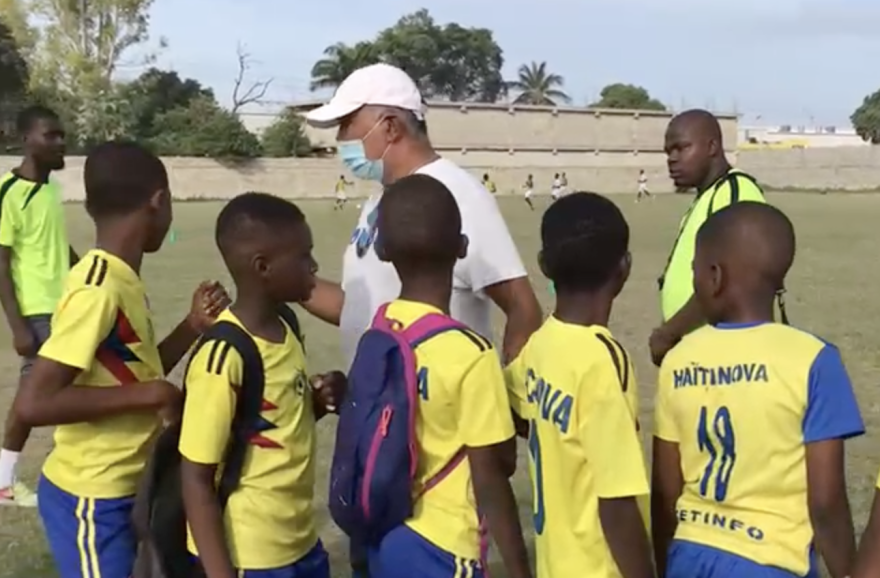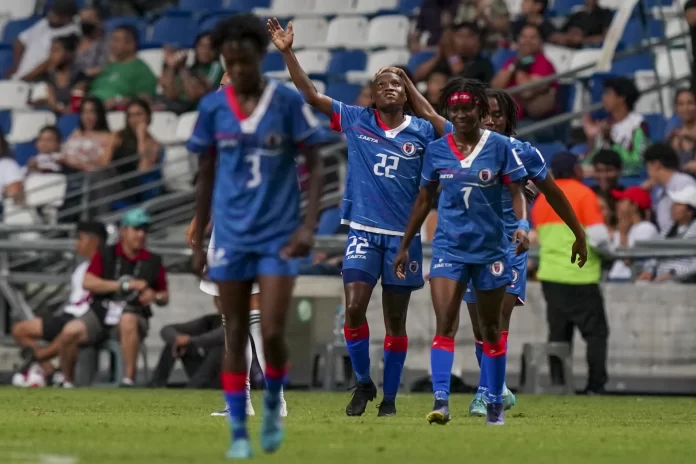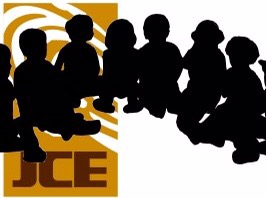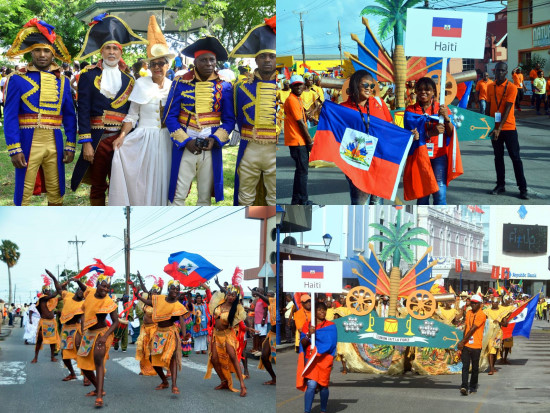Soccer is standing tall above the catastrophic collapse of Haiti’s government and economy. The women’s national team has qualified for the World Cup for the first time. But more important: youth soccer programs in Haiti are looking for more support to help keep kids out of the powerful gangs that are terrorizing the country.
Kids like Jean-Louis, a 14-year-old boy growing up in Cité Soleil, one of the worst slums of Port-au-Prince, Haiti.
Jean-Louis — we’re not using his last name for safety reasons — told WLRN by WhatsApp that he hears the sound of gang gunfire in his neighborhood almost daily.
What Haitian kids like him don’t hear enough, he said, is the happier cacophony of the soccer practices he attends, run by a youth support nonprofit called FONDAPS. Thanks to the program, he points out, he wants to be a lawyer someday.
“A lot of times we have to hide under our beds” when the shooting erupts in Cité Soleil, Jean-Louis says. “It’s the only safe place we have. That and the soccer field. That’s where I learn respect for things.”
FONDAPS isn’t new. It’s been around for 16 years — and, in fact, in 2011 its founding director, Haitian businessman Patrice Millet, won a CNN Heroes award for helping thousands of kids rebound from Haiti’s 2010 earthquake.

But the mission for Millet and FONDAPS today is broader and more urgent. It’s about preventing kids from joining gangs. The gangs that control most of Port-au-Prince, and much of the rest of the country. Gangs that terrorize Haitians through murder, kidnappings and hijackings of crucial necessities like food.
“The gangs are worse than the earthquake — much, much worse,” Millet told WLRN recently in Miami, where he comes for treatment for the cancer he was diagnosed with 17 years ago. It was that illness that motivated him to start FONDAPS, which stands for La Fondation Notre Dame du Perpétuel Secours, or The Foundation of Our Lady of Perpetual Help, Haiti’s patron saint.
FONDAPS teaches kids soccer, of course, but also self-improvement, including community service, civics and study skills. And it gives them food to take home. All of that is critical, Millet says, because so many of them are from communities like Cité Soleil — where gangs rule.
“It’s very difficult to keep a kid out of gangs in Haiti today,” Millet says. “If they want to have some money, whatever they want, they have to go into gangs.
“But when a kid goes to the soccer field, there is no violence. And he receives some food, so when he goes back to his family, he comes with something — and he’s very proud. And he will see that the good people are on the soccer field, and the bad people are in the gangs.”
That’s not to say schools don’t matter in Haiti; they certainly do — even more than soccer programs. But unfortunately,the country’s public education system is as wrecked and collapsed as its government is. Meanwhile, the international community can’t agree on how to confront the gangs.
So for now, there’s a growing consensus that there are two main ways to at least weaken Haiti’s gangs: cut off the flow of guns being smuggled to them — especially from U.S. states like Florida — and reduce the flow of children and teenagers they exploit.
As a result, U.S. State Department agencies like USAID and the Bureau of International Narcotics and Law Enforcement Affairs, or INL, are conducting youth support projects inside Haiti, including “learning laboratories” and vocational skills training.
“We’re seeing the gangs doing more and more to try to recruit younger people into their ranks,” the Assistant Secretary of State for the INL, Ambassador Todd Robinson, told WLRN last year around the same time UNICEF warned the gangsters had begun to target schools more aggressively.
“And so if we don’t give those youths alternatives, that would be tragedy.”
It’s very difficult to keep kids out of gangs in Haiti. But they will see that the good people are on the soccer field and the bad people are in the gangs.
Patrice Millet
Some in the Haitian diaspora, including expat organizations in South Florida, are also recognizing that urgent need for youth support in Haiti. Nonprofit groups like the Ayiti Communist Trust in Miami are sponsoring programs ranging from sports to music to agribusiness.
FONDAPS has mentored several role models for Haitian kids — including Roselord Borgella, the national women’s soccer team’s leading scorer.
Borgella, who grew up in poverty near Port-au-Prince, spoke to WLRN from Dijon, France, where she plays professionally today and is preparing for this summer’s World Cup in Australia and New Zealand.
“When a girl is hungry in Haiti,” Borgella says, “that may lead her to do terrible things — like join a gang. So I hope our soccer success will motivate more people to help train more Haitian kids to pursue a dream, any kind of dream, as I was able to do.
“When I came to FONDAPS I was the only girl, but they encouraged me to stay and learn discipline. That’s why I am the person I am today. Kids in Haiti need something to occupy their minds even more today than we did back then.”
Where being a kid is a luxury
That’s a big reason efforts like FONDAPS are reaching out for reinforcement to U.S. philanthropists like Tracy Gregorowicz of New York, who’s now a big financial supporter.
“The threat of gangs on the well-being of Haitian children is huge,” Gregorowicz says.
“Just being able to be kids, you know, it’s a luxury in Haiti. Organizations like FONDAPS are really lifelines — and they are not supported enough, and I don’t really understand why.”
“Not every kid [in FONDAPS] is going to become a professional soccer player, so soccer isn’t all we do,” one FONDAPS coach, Jean-Francois Stanley, told WLRN from Port-au-Prince via WhatsApp.
“But what we can teach every kid is to become a model citizen, so that, as this violence and insecurity ravages Haiti, we can keep them from falling into it. We do this work because we believe in what it can do for the future, not just soccer.”

In Miami’s Little Haiti, high school teacher and popular soccer mentor Gomez Laleau says he understands the increasing focus on soccer in Haiti, where he grew up, as a means of filling the gaping education void.
“It’s a simple but very effective — and very hopeful — way to get them involved in something besides what they see in the gang-controlled neighborhoods,” says Laleau.
Right now, the international fame of the Haitian women’s soccer team may be doing the most to bring more kids out to soccer fields like the two FONDAPS runs in Port-au-Prince. But a lot more fields — and balls and shoes and jerseys and equipment and food — will be needed.




























![Phyllisia Ross – KONSA [Official Music Video]](https://haitiville.com/wp-content/uploads/2014/08/phyliisia.jpg)









